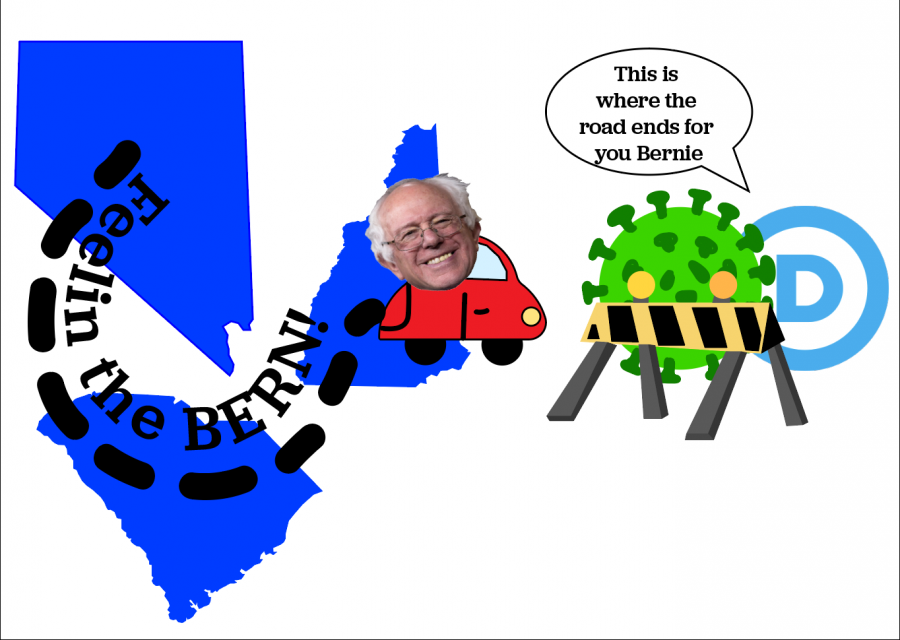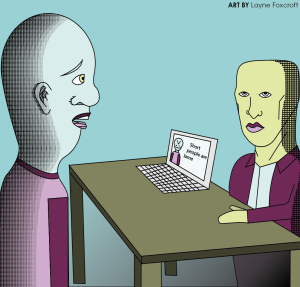Senator Bernie Sanders drops out of presidential election
Senator Bernie Sanders faced a difficult decision this week. After losing three straight states and being unable to campaign due to COVID-19, he decided to suspend his campaign for president.
April 13, 2020
Senator Bernie Sanders faced a difficult decision this week. After losing three straight states and being unable to campaign due to COVID-19, he decided to suspend his campaign for president. Suspending a campaign is a difficult decision to make, especially since Sanders was surging in February after wins in New Hampshire and Nevada. That being said, suspending the campaign was the right decision to make.
I struggled to understand what caused Sanders to go from the clear frontrunner to deciding to drop out. No campaign can be perfect but I felt that he had clear, concise policies that are supported by the majority of Democratic voters. His campaign improved with groups that were skeptical of Sanders in his 2016 run, like black voters, voters with disabilities and more. To me, it seemed like he was the obvious choice for the nomination.
Bernie’s evolution on disability rights issues was a blessing to me. He was rightfully criticized by disability advocates in 2016 for being largely silent on disability rights. My brother has Down syndrome and autism and I often hear from my parents about the issues that face people like my brother. When Bernie introduced in his disability rights plan this year, I felt relieved as he made key policy points that would directly help my brother. Seeing how Bernie evolved on disability rights reassured me that everyone is included in Bernie’s message.
During Bernie’s 2016 presidential campaign, he struggled with earning the vote of black voters. His campaign made stronger attempts at making inroads with black voters but gaffes were made. Before the Mississippi primary, Sanders canceled a rally in Jackson to instead campaign in Michigan. On March 1st, the anniversary of Bloody Sunday, Sanders was the only major candidate to skip the event and held a rally in Los Angeles instead. Bernie needed to aggressively court endorsements from prominent black politicians, like Jim Clyburn and John Lewis, but no such effort was made.
A hallmark of Bernie’s campaign was his criticism of both the Democratic Party and the Republican party. His stump speech would often include jabs against the Democratic establishment and that rhetoric helped with independent voters but it hurt him with the key voters in the Democratic primary: Democrats. Given that Bernie is an anti-establishment politician, it makes sense that he criticizes both parties. That rhetoric didn’t play well with a lot of Democrats because the top issue for Democrats this election isn’t about healthcare, or climate change, or the economy. It’s about defeating Trump and myself and other Democrats felt that attacking the Democratic party isn’t helpful, especially when we’re trying to defeat Trump.
I try not to play armchair campaign manager but I think Bernie would’ve been more successful in the primary if his campaign made a few tweaks. One, he needed to make an aggressive black voter outreach campaign, including endorsements from prominent elected officials. I think that many find Bernie unlikable or someone who’s always grumpy but if you watch his interviews, he often cracks jokes and is rather laid back. He needed to carry that energy to the debate stage and turn down the yelling. Lastly, his campaign failed to make significant outreach to older voters. Older voters rejected Bernie in 2016 and little progress was made in 2020. Although Bernie has broad support among younger voters, older voters show up in larger numbers and young voters simply didn’t give him the boost he needed.
Bernie’s 2020 campaign made a lot of progress from his 2016 run. He energized young voters, had high support among Latinos and genuinely listened to groups that didn’t support him in 2016. I now understand why Bernie was unsuccessful in his 2020 bid, but I won’t forget how he made people like me and my brother finally feel included in the political process.











Colby Richards • Apr 13, 2020 at 4:38 pm
????????? ? ???? ????? ?? ??? ????? ?? ? ??? ????? ??? ??? ?✨